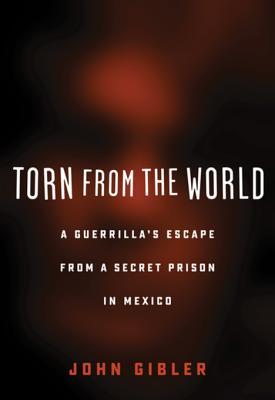
Torn from the World
A Guerrilla's Escape from a Secret Prison in Mexico
کتاب های مرتبط
- اطلاعات
- نقد و بررسی
- دیدگاه کاربران
نقد و بررسی

May 14, 2018
Journalist Gibler (I Couldn’t Even Imagine That They Would Kill Us) presents a raw and stirring portrait of Andrés Tzompaxtle Tecpile, a member of the Popular Revolutionary Army, a guerrilla group in Guerrero, Mexico, who survived kidnapping, imprisonment, and torture by the Mexican army. In October of 1996, Tzompaxtle was kidnapped and taken to a secret prison, where for four mouths he was beaten and repeatedly tortured by electric shocks in an effort to coerce out of him information about his group’s whereabouts. Drawing from numerous interviews with Tzompaxtle and his family, as well as others involved in Mexico’s underground resistance, Gibler constructs an account of the entire ordeal including Tzompaxtle’s unlikely escape, which he presumed was a suicide mission, and his continued clandestine fight “against a criminal state” in the years since. In his telling of Tzompaxtle’s story, Gibler reflects on the economically and politically deprived state of Guerrero, the decades-long struggle between armed resistance and Mexico’s repressive government, and to what extent he can write about violence without perpetuating it. Gibler’s fervent glimpse into Mexico’s underground succeeds in his goal to bring to light the struggles of the oppressed and traumatized people there.

May 15, 2018
An account of a guerrilla prisoner's torture in--and eventual escape from--a secret Mexican prison.Like Gibler's previous book on Mexican disappearances (I Couldn't Even Imagine that They Would Kill Us: An Oral History of the Attacks Against the Students of Ayotzinapa, 2017), this is a work of advocacy journalism, one that dispenses with any pretense of objectivity in pursuit of a deeper truth. Even more provocatively, the author recognizes that in matters involving torture, the whole story may never be known. The experience transcends language and short-circuits memory, and it can't be captured in the words of a cohesive narrative. "Torture is an extreme act of rupture and isolation," writes Gibler before continuing to explore "the impossibility of communicating such pain, and the disconnection from language within the experience of pain." The testimony of the captured guerrilla and the torture he experienced provides the heart of the narrative, rendered in the second person: "You don't know if you'll make it. That depends on them, they might even kill you by accident." The author provides contextual elaboration for the direct quotes as well as accounts from journalists and officials, some of whom were skeptical of the veracity of the account, particularly of the prisoner's ability to escape. Some of his former comrades feared that he'd cooperated with his captors, providing sensitive information and naming names. Gibler clearly believes his subject, but his inclusion of so many other perspectives suggests the difficulty of reporting on a subject so fraught with secrecy, where even crucial information from the man who is the subject of the book must be shielded to protect him. "This isn't a dead man's book," says the escaped guerrilla. "This book is about someone alive. The book won't tell the whole story."The reasons why this book can't tell the whole story--and how the stories it tells conflict--are fascinating tales in their own right.
COPYRIGHT(2018) Kirkus Reviews, ALL RIGHTS RESERVED.

June 1, 2018
The story of Andrés Tzompaxtle Tecpile will be familiar to those who study Latin American history--an indigenous man kidnapped by government soldiers and tortured for months. A member of the insurgent group called EPR (Popular Revolutionary Army), his nom de guerre is "Rafael." Though it sounds like something from the distant past, Rafael was abducted in 1996. Journalist and author Gibler (Mexico Unconquered: Chronicles of Power and Revolt) interviewed Tecpile, who is still living in Mexico following his escape. Gibler also includes historical and political context to help illustrate how Mexican society has evolved into one of violent resistance and conflict. The firsthand account given by Tecpile is at times difficult to read because of the abuse he experienced, but it is an important story that needs to be told. VERDICT Gibler does Tecpile justice in sharing his experience eloquently and truthfully. This work will hold wide appeal for anyone interested in social activism, civil rights, and Mexican history.--Susan E. Montgomery, Rollins Coll., Winter Park, FL
Copyright 2018 Library Journal, LLC Used with permission.

Starred review from July 1, 2018
Andr�s Tzompaxtle Tecpile, a member of a guerrilla group in the Mexican state of Guerrero, was abducted by the Mexican military one evening in October 1996, held for four months, and brutally tortured. Gibler, the author of the shattering I Couldn't Even Imagine That They Would Kill Us (2017), presents another devastating but necessary book. Reading this in light of the confirmation of the latest director of the CIA, Gina Haspel, who oversaw enhanced interrogation techniques in an earlier CIA position, is especially poignant in that this is a powerful reminder of the dreadful cost the use of torture entails, and of the U.S.' role in perpetuating torture on the American continents. Gibler's interviews with Tzompaxtle Tecpile provide the marrow for a carefully researched, meticulously constructed, and often excruciating narrative. While honoring Tzompaxtle Tecpile's story, Gibler honors the reader's intelligence, nimbly deconstructing the roots and the legacy of torture. This is an important look at the price exacted by the legitimatizing of state-sponsored violence and the concealment of the truth about such operations, and their disastrous consequences for everyone.(Reprinted with permission of Booklist, copyright 2018, American Library Association.)

























دیدگاه کاربران